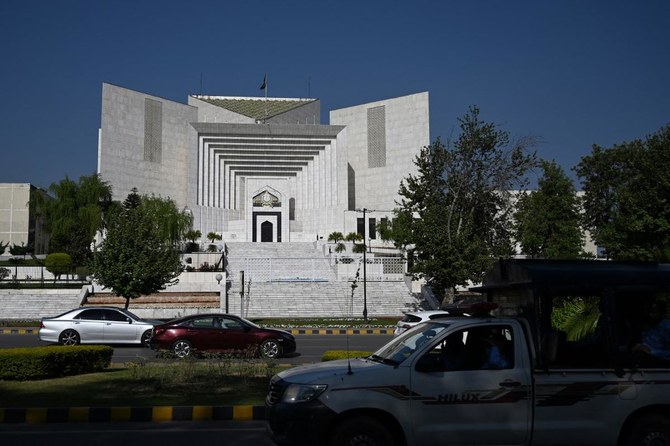ISLAMABAD: A five-member bench of the Pakistan Supreme Court will take up on Monday about a dozen petitions challenging the trials of civilians by military courts in a case that is certain to pit the judiciary under Chief Justice Qazi Faez Isa against the country’s all-powerful army.
The Pakistan government and army said earlier this year suspects accused of attacking army installations in countrywide protests in May in the wake of the brief arrest of former Prime Minister Imran Khan would be tried in military courts.
The announcement has faced widespread criticism from within Pakistan and rights organizations globally because of their secretive nature and their existence alongside a functioning civilian legal system.
A bench led by Justice Ijazul Ahsan and including Justice Munib Akhtar, Justice Yahya Afridi, Justice Mazahar Ali Akbar Naqvi and Justice Ayesha Malik will hear the petitions against trying civilians in military courts at 11:30am on October 23.
The pleas include those filed by Khan, the Supreme Court Bar Association (SCBA), politician and lawyer Aitzaz Ahsan, former chief justice of Pakistan Jawwad S Khawaja and others.
“The court would want to restrain the Pakistan Army from taking any unconstitutional step,” then Chief Justice Umar Ata Bandial had observed when the case was last heard earlier this year. He has since retired and been replaced by Chief Justice Isa, whose elevation garnered nationwide interest given his reputation as a maverick judge and his hard-hitting judgments criticizing the role of the country’s powerful military in politics.
On Thursday, CJ Isa had remarked, during another hearing, that the top court would be hearing important cases, such as on the trial of civilians by military courts and holding elections on time, in the coming weeks.
During a hearing on June 27, the federal government had assured the court that a formal trial had not yet commenced against 102 individuals held by military authorities in connection with the May 9 violent protests.
Pakistan’s Army Act of 1952 established military courts primarily to try members of the military or enemies of the state. Civilians can only be tried there under a federal government order.
Civilians accused of offenses such as waging war against the armed forces or law enforcement agencies, or attacking military installations or inciting mutiny, can be tried at military courts.
Military courts operate under a separate system from the civilian legal system and are run by military officers. The judges are also military personnel and cases are tried at military installations.
Trials are closed to outsiders, and no media presence is allowed.
Anyone tried under the Army Act has the right to defend themselves and a counsel of their choice.
There is no right to appeal but individuals can challenge the question of jurisdiction in high courts and the Supreme Court.
















